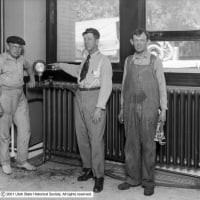Welcome! Here are the website rules, as well as some tips for using this forum.
Need to contact us? Visit https://heatinghelp.com/contact-us/.
Click here to Find a Contractor in your area.
If our community has helped you, please consider making a contribution to support this website. Thanks!
testing capacitors
Options
[Deleted User]
Posts: 672
k.i.s.s.? exactly
0
Comments
-
I have a furnasty with a blower that will only run if you have spun it a bit prior to telling it to run. I am thinking capacitor but do not recall how to test the cap before calling it a motor. I get 120V at the lead (red) but no blower action...
Thanks, TimJust a guy running some pipes.0 -
the only real way to verify a capacitor's value is with a meter that tests capacitance
but if you don't have a meter or can't borrow one, an easy and inexpensive way is to simply replace the capacitor and see what happens. if that doesn't do it, it's the blower motor, and you haven't wasted the money on a new capacitor, because you'd want to replace the old capacitor with a new one anyway if you change the motor0 -
1. Take your meter and put
it on the ohms scale.
2.Disconnect the capacitor and discharge it.
3. Place the leads across the connectors on the capacitor, it should register high then low in other words it charges then discharges.
4. With an Analog meter it is easy because the needle should go up then down. If it does not do that replace it.
Quick temporary fix, get a light bulb screw in fixture wire it across the wires that were previously connected to the capacitor, screw in a 100 watt bulb, flip the power switch and the motor will run until you get a new capacitor.0 -
Or
you could hook the capacitor up to 110V and measure the current draw and the applied voltage. If it's a start capacitor don't leave it hooked up more than 10 sec.. Then multiply the current draw times 2650 and devide by the (measured) voltage the answer is in MFD ( micro ferrads) and should be within 10% of the MFD rating printed on the capacitor. Saves buying and lugging around another meter. Plus do what Tim said, that tells if it's shorted. bobThere was an error rendering this rich post.
0 -
whoa!! k.i.s.s.
its only a capacitor0 -
I would not do this
without some convincing evidence that it is safe.
What if it was shorted?
The ohmeter thing is safe and probably a pretty good indicator of the capacitor's condition.
The ohmeter has a small battery which charges up the capacitor. As the capacitor's voltage reaches the same voltage as the ohmeter's, the ohmeter will read less and less current flowing (milliamps), until the capacitor's voltage equals the ohmeter's and the current flow will stop.
A digital meter will work, but an analog meter is much nicer, as the needle rises and falls... taking longer on larger capacitors.0 -
KISS
Keep
It
Super
Simple
To Learn More About This Professional, Click Here to Visit Their Ad in "Find A Professional"There was an error rendering this rich post.
0 -
Or in a nastier
vein... keep it simple, stupid!0
This discussion has been closed.
Categories
- All Categories
- 87.3K THE MAIN WALL
- 3.2K A-C, Heat Pumps & Refrigeration
- 61 Biomass
- 429 Carbon Monoxide Awareness
- 120 Chimneys & Flues
- 2.1K Domestic Hot Water
- 5.8K Gas Heating
- 114 Geothermal
- 166 Indoor-Air Quality
- 3.7K Oil Heating
- 77 Pipe Deterioration
- 1K Plumbing
- 6.5K Radiant Heating
- 395 Solar
- 15.7K Strictly Steam
- 3.4K Thermostats and Controls
- 56 Water Quality
- 51 Industry Classes
- 50 Job Opportunities
- 18 Recall Announcements

